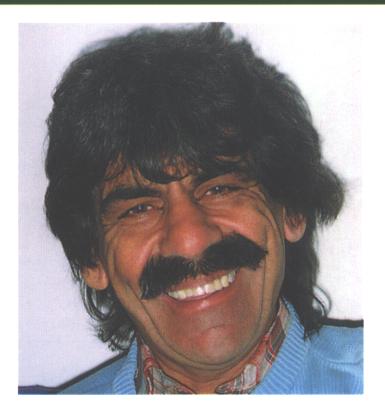|
|
Wadi
Soudah
In
his first book Kafka und andere Palästinensische Geschichten,
he tells stories not only about his life in Nablus and the
obstacles and harsh situation under Israeli occupation, he
also describes everyday life in rural Palestine in a funny
and objective way. He makes the readers aware of the social
problems of women and children. His stories are full of humor
and sarcasm. In one of his stories, he tells his mother that
the Americans landed on the moon. She says, „Thank
God, now they can leave us in peace.“ In another story
his family gets a new phone. One member of the family wants
to clean the phone’s ears because he can’t hear
the voice of Wadi from Germany. Even though Soudah’s stories are full of bitter irony, they are not melancholic. Behind his humor is hidden an indirect criticism of German society and German institutions. He challenges his readers to see the issues he deals with through the eyes of the other, the foreigner. In his second book, Absturz im Paradies from 1998, Soudah reveals himself as a master of irony, and sarcasm describing critically and with humor the problems that immigrants face in Germany. In the story ”Sheherezade im NATO-Land,“ Soudah (1998) discusses the image of the Arab in Western societies and the assumption that an Arab-German writer is expected to tell stories from “1001 nights” in an oriental atmosphere full of belly dancing, flying carpets and camels. Soudah objects to this stereotypical depiction of Arabs and instead tells a modern political story in the style of the 1001 nights. However, Sheherezade is not a princess from 1001 nights in search of a prince on an Arabian horse. Sheherezade of the 20th century is a young asylum seeker who dreams of papers, stamps and a new home. Books • Kafka
und andere Palästinensische Geschichten (Brandes & Apsel,
Frankfurt 1991) |
|||||||



 Wadi
Soudah, was born in 1948 in Nablus, Palestine. He hails from
a big shepherd family. Between 1969 and 1977 he studied sociology
and Islamic philosophy in Beirut. Then he lived in Jordan,
and in 1979 came first to Heidelberg, then to Bielefeld to
continue his graduate studies. He didn’t finish because
of the civil war in Lebanon. He was forced to stop his studies
after earning his master’s degree. He had two non-functioning
kidneys.
Wadi
Soudah, was born in 1948 in Nablus, Palestine. He hails from
a big shepherd family. Between 1969 and 1977 he studied sociology
and Islamic philosophy in Beirut. Then he lived in Jordan,
and in 1979 came first to Heidelberg, then to Bielefeld to
continue his graduate studies. He didn’t finish because
of the civil war in Lebanon. He was forced to stop his studies
after earning his master’s degree. He had two non-functioning
kidneys.